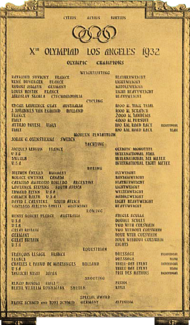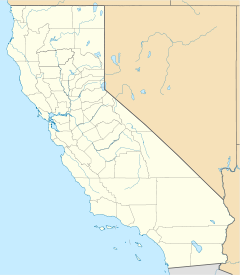Sailing at the 1932 Summer Olympics
| Sailing at the Games of the X Olympiad |
||||||||||||||||
|---|---|---|---|---|---|---|---|---|---|---|---|---|---|---|---|---|

Xth Olympiad Los Angeles Bronze tablet Yachting
|
||||||||||||||||
| Venues | Los Angeles Harbor | |||||||||||||||
| Dates | First race: 5 August 1932 Last race: 12 August 1932 |
|||||||||||||||
| Sailors | 57 from 11 countries | |||||||||||||||
| Boats | 23 | |||||||||||||||
| Top ranked countries | ||||||||||||||||
|
||||||||||||||||
| Los Angeles Harbor | |
|---|---|
| Angels Gate light | |

Entrance to the Los Angeles Harbor.
On the right the courses of the Snowbird were laid. To the left those of the other three classes. |
|
|
Location within California
|
|
| General information | |
| Status | Complete |
| Type | Olympic harbor |
| Location | San Pedro Breakwater |
| Town or city | Los Angeles, California |
| Country |
|
| Coordinates | 33°42′30.5″N 118°15′06.0″W / 33.708472°N 118.251667°WCoordinates: 33°42′30.5″N 118°15′06.0″W / 33.708472°N 118.251667°W |
| Elevation | Sealevel |
| Construction started | 1910 |
| Opened | 1913 |
| Cost | $36,000 |
| Owner | US Coast Guard |
| Design and construction | |
| Architect | Unknown |
Sailing/Yachting is an Olympic sport starting from the Games of the 1st Olympiad (1896 Olympics in Athens Greece). With the exception of 1904 and possible 1916 sailing was always a part of the Olympic program. The Sailing program of 1932 consisted of a total of four sailing classes (disciplines). For each class races were scheduled from 5–12 August directly off the Los Angeles Harbor on the Pacific Ocean.
Source:
The Xth Olympiad Yachting events were raced in the Pacific Ocean directly off the Port of Los Angeles, over a course used for the past eight years in local yachting. This course was selected because of its suitability for wind conditions, its freedom from tides and swift currents, and the clearness of its waters, with the added advantage of offering spectators a full view from the Point Fermin headlands. Constant winds were assured as in this locality the trade wind comes up about mid-day, bringing with it a true westerly wind varying from eight to fifteen knots in velocity.
Due to the predicted Sea breeze in Los Angeles Harbor it was decided to race the Snowbirds in the lighter morning breezes. However, during the mornings there was virtually no wind at all. Therefore some races of the Snowbird were sailed in the afternoon in heavy conditions. Luckily no capsizing took place. It also gave issues for those sailors who were competing not only in the Snowbird but also in one of the other classes.
The courses had been well prepared. The marks were laid by the United States Lighthouse Service in the form of large Government buoys, and kelp beds under the lee of Point Fermin were marked by the United States Navy Department as restricted area. Visiting yachts were kept at a safe distance from the racing boats by the US Coast Guard. Tows were arranged by the US Navy to and from Los Angeles Harbor to the race area's. On the Pacific side of the San Pedro Breakwater the Star, 6 Metre and 8 Metre yachts had their races. Those classes had to pass the Angels Gate light in order to reach the course area. The Snowbird stayed inside the breakwater to protect them from the ocean swell.
...
Wikipedia

